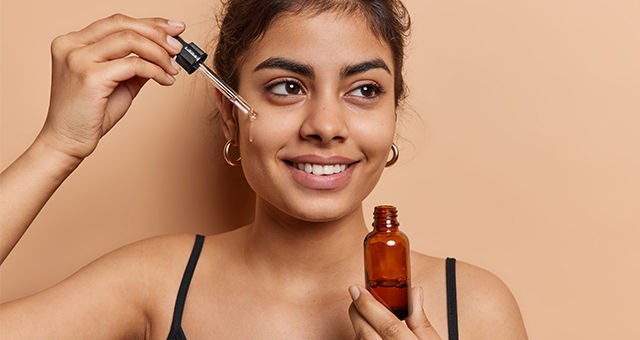
In This Story:
- What Is Glycerin?
- Why Is Glycerin Good For Skin?
- Experience the Amazing Benefits of Glycerin for Skin
- How To Add Glycerin To Your Skincare Routine?
- How To Use Glycerin For Skin Brightening?
- Essential Tips And Precautions For Using Glycerin For Face
- Key Takeaways On Glycerin For Skin
- FAQs On Glycerin For Skin
Glycerin, a simple yet powerful ingredient, has earned its place in skincare routines. Renowned for its hydrating and healing properties, it nourishes and replenishes the skin. It attracts moisture from the environment and locks it in, creating a dewy glow and ensuring your skin remains soft and supple. Whether you have dry, oily, or combination skin, glycerin is a versatile ally. With its affordability and wide availability, it is a go-to solution for tackling skin dryness, irritation, and dullness, making it indispensable in skincare regimens.
What Is Glycerin?
Glycerin, also known as glycerol, is a colourless, odourless, and viscous liquid derived from natural plant oils or synthetic sources. It is a humectant, which means it attracts water to the skin, helping it retain moisture. Glycerin is used in numerous skincare products, from moisturisers and serums to soaps and lotions. Its ability to absorb and lock moisture makes it a potent ally for those seeking hydrated and plump skin. In its pure form, glycerin can be applied directly to the skin or mixed with other ingredients to enhance its benefits.
Why Is Glycerin Good For Skin?
Glycerin is a skincare superhero that's long overdue for its moment in the spotlight. This simple, clear liquid is an all-star humectant, pulling moisture into the skin and trapping it for extended hydration. It's gentle, non-comedogenic, and appropriate for all skin types, from sensitive and acne-prone skin to normal and dry skin. Glycerin helps fortify the skin's barrier, defending the skin against environmental stressors and facilitating skin repair. Its moisturising action leaves the skin soft and silky, which is why it features in many moisturisers and cleansers. Inexpensive and highly effective, glycerin is a skincare staple.
Experience the Amazing Benefits of Glycerin for Skin
Glycerin fortifies the skin barrier, defending against environmental aggressors and facilitating repair. Its moisturising benefits soften and smooth the skin, explaining why it forms part of a variety of cleansers and moisturisers. An affordable and versatile ingredient, glycerin really is a beauty essential. Here are some key advantages:
- Keeps Skin Young: Glycerin is a hydration hero, pulling moisture into the skin and trapping it there for long-lasting hydration. This plumping action smooths fine lines and increases elasticity, giving your skin a youthful, dewy appearance. Daily use keeps your skin feeling supple and radiant.
- Preserves Other Ingredients: Glycerin doesn't just hydrate; it also enhances the efficacy of other skincare ingredients. By improving ingredient stability and penetration, it ensures your serums and creams work more effectively, delivering better results. It's the unsung hero boosting your skincare routine.
- Brightens The Skin: Glycerin promotes a radiant complexion by maintaining hydration levels. A well-moisturised face reflects light better, giving the skin a healthy, glowing appearance.
- Anti-Ageing Properties: Hydrated skin looks plumper, and glycerin contributes to maintaining youthful-looking skin by helping reduce the formation of fine lines and wrinkles. A constant hydration boost keeps the skin more elastic and resilient.
- Deep Hydration: Glycerin excels at drawing moisture from the environment and delivering it to the skin. This ability helps to keep the face hydrated, even in dry weather or indoor environments. For those with dry skin, glycerin can serve as a natural and effective moisturiser, preventing tightness or flakiness.
- Skin Barrier Protection: Glycerin strengthens the skin’s natural barrier, which helps to retain moisture and defend against environmental stressors. A strong skin barrier protects against pollutants and harmful microorganisms, keeping the skin healthy and balanced.
- Improved Skin Texture: Regular use of glycerin can result in smoother, softer skin. By keeping the skin hydrated and replenished, it encourages cell turnover, which helps to reduce the appearance of fine lines and rough patches.
- Healing and Soothing: For sensitive or irritated skin, glycerin’s soothing properties can help calm redness and inflammation. It can be beneficial for conditions such as eczema or psoriasis, providing relief by maintaining skin hydration and promoting healing.
- Brightening Effect: Glycerin promotes a radiant complexion by maintaining hydration levels. A well-moisturised face reflects light better, giving the skin a healthy, glowing appearance.
- Acne-Fighting: Glycerin is non-comedogenic, meaning it won't clog pores, making it a great option for those with acne-prone skin. By keeping the skin balanced and moisturised, it helps prevent the overproduction of oils that can lead to breakouts.
- Anti-Aging Benefits: Hydrated skin looks plumper, and glycerin contributes to maintaining youthful-looking skin by helping reduce the formation of fine lines and wrinkles. A constant hydration boost keeps the skin more elastic and resilient.
How To Add Glycerin To Your Skincare Routine?
Adding glycerin to your skincare routine is simple and effective. However, remember that consistency is key. Glycerin's full benefits for skin shine when it’s part of a regular skincare routine, ensuring your skin stays soft, radiant, and hydrated throughout the day. Here are our favourite ways of using glycerin in our daily routine:
1. Moisturiser
Applying a few drops of glycerin directly to your face, especially while the skin is still slightly damp after cleansing, is the ultimate secret to boosting your skin’s moisture levels. It will lock in moisture and leave your skin soft and hydrated. Try the Wishcare Pure & Unscented Glycerine that can be applied both to the skin and the hair.
2. Dilute For Hydration
Glycerin is potent, so it's often best to dilute it with water or other hydrating agents. Mix glycerin with rose water or aloe vera gel for added soothing and refreshing effects. We recommend the AromaMusk Organic Glycerine that suits all skin types.
3. Concentrated Serums
Look for serums containing glycerin as a primary ingredient. These are often more concentrated and can be used for targeted hydration and anti-ageing benefits. The Olay Total Effects Night Cream with glycerin fights 7 common signs of ageing.
4. Homemade Face Masks
You can make a simple hydrating face mask by mixing glycerin with honey and yoghurt. This will not only moisturise but also brighten the skin. Use the Wild Organic pure & unscented glycerine which is water-soluble and super easy to use.
5. Toner
Mix glycerin with a mild toner or a soothing solution, such as cucumber juice, for an added layer of moisture that prepares the skin for subsequent skincare steps. You can also simply use the Mystiq Living Glycerine & Rose Water Toner Spray Combo for easy application.
Anti-Ageing Masks
Adding glycerin to your anti-ageing masks can considerably amplify their moisturising and rejuvenating effects. Glycerin is a humectant, and it attracts water to the skin, which fills fine lines and gives a bounce to the skin. For a homemade mask, mix glycerin with natural products like honey and aloe vera. This mixture not only moisturises but also calms the skin, giving a youthful complexion.
Face & Body Shops
Face and body shops commonly have a variety of glycerin-enriched products ideal for an everyday skincare regimen. These products, such as moisturisers, cleansers, and serums, take advantage of the ability of glycerin to preserve skin hydration and barrier function. Daily use can make the skin softer and more supple, eliminating the look of ageing signs. When choosing products, find those that have glycerin included in the top ingredients to guarantee effectiveness.
How To Use Glycerin For Skin Brightening?
Glycerin can play a crucial role in achieving brighter, more radiant skin by retaining moisture and promoting a healthy glow. Here's how you can use glycerin for skin to brighten your complexion:
- Glycerin and Lemon Mask: Mix glycerin with a few drops of fresh lemon juice. Lemon is rich in vitamin C, which helps lighten dark spots, while glycerin locks in moisture, ensuring the skin doesn’t dry out. Apply this mask for 15-20 minutes before rinsing off.
- Glycerin and Turmeric: Turmeric is known for its skin-brightening and anti-inflammatory properties. Mix it with glycerin to create a paste that can reduce pigmentation and dark spots while keeping the skin nourished.
- Use Glycerin in Your Regular Routine: Adding glycerin to your daily skincare products, such as moisturisers or serums, will maintain moisture and radiance. moisturised skin is naturally brighter and more vibrant.
- Glycerin and Honey: Honey has skin-brightening properties as well. By mixing it with glycerin, you can create a hydrating, brightening mask that helps illuminate your face.
Glycerin ensures your skin stays hydrated and nourished, while other ingredients can target specific concerns like dark spots, leaving you with glowing, even-toned skin.
Essential Tips And Precautions For Using Glycerin For Face
While glycerin for skin is generally safe, there are a few precautions to keep in mind:
- Patch Test: Always perform a patch test before using glycerin on your face, especially if you have sensitive skin. Apply a small amount on your wrist or behind your ear and wait 24 hours to check for any adverse reactions.
- Don’t Overapply: Glycerin is highly concentrated, so using too much may make your skin feel sticky. A few drops are usually enough.
- Avoid Excessive Sun Exposure: Since glycerin draws moisture from the environment, excessive sun exposure could lead to skin dryness. Make sure to follow up with sunscreen when using glycerin during the day.
- Combine With Other Hydrating Ingredients: To enhance glycerin's benefits, combine it with aloe vera, rose water, or other hydrating agents that complement its moisturising effects.
- Store Properly: Keep glycerin in a cool, dry place, and make sure the cap is tightly closed to avoid contamination.
Key Takeaways On Glycerin For Skin
Glycerin for skin is a versatile, natural humectant that hydrates and nourishes the skin. It promotes smoother, softer, and brighter skin while preventing moisture loss. It also helps with acne prevention, improving skin texture, and reducing signs of ageing. Incorporate glycerin into your skincare routine by using it as a moisturiser, serum, or mask. While generally safe, always do a patch test and avoid excessive application to prevent stickiness. With consistent use, glycerin ensures your skin stays radiant, smooth, and healthy.
FAQs On Glycerin For Skin
-
Is glycerin good for the skin?
Yes, glycerin for skin is an excellent option. It hydrates, soothes, and helps maintain the skin's natural barrier, promoting a healthier complexion.
-
How does glycerin hydrate the skin?
Glycerin attracts moisture from the environment and locks it into the skin, keeping it hydrated and preventing dryness.
-
Does glycerin reduce dark spots or hyperpigmentation?
While glycerin itself does not directly target dark spots, its ability to moisturise and promote skin regeneration can contribute to a brighter, more even complexion over time.
-
How should I use glycerin on my skin?
Apply glycerin directly to damp skin, mix it with other ingredients like rose water, or incorporate it into your regular skincare products for added hydration.
-
Are there any side effects of using glycerin on the skin?
Glycerin is generally safe, but excessive use may cause stickiness or attract too much moisture, which could make the skin feel greasy. Always perform a patch test to avoid irritation.
